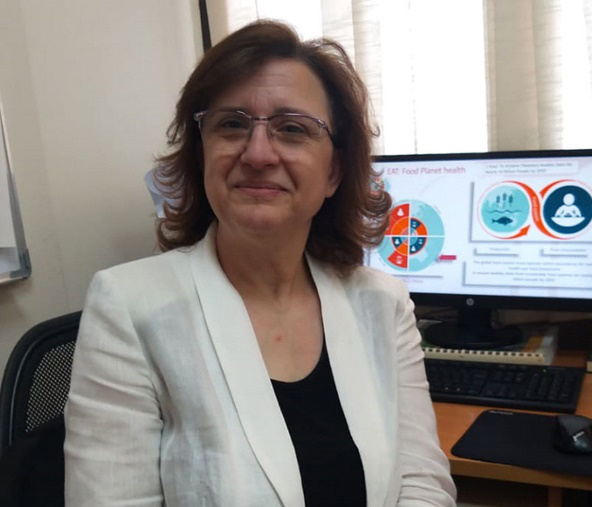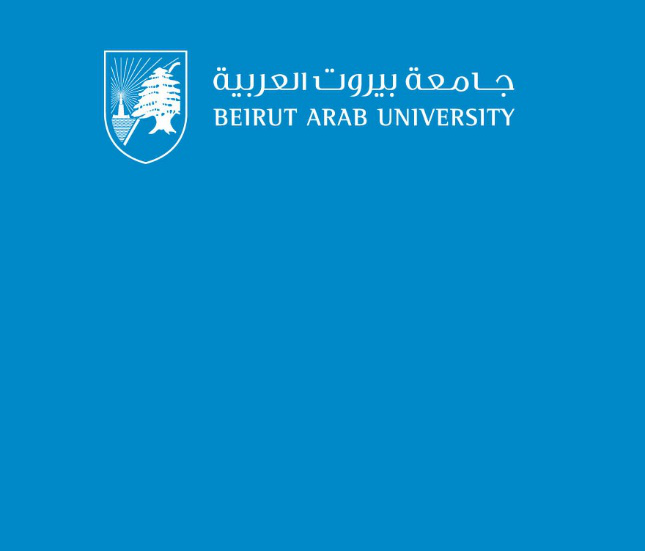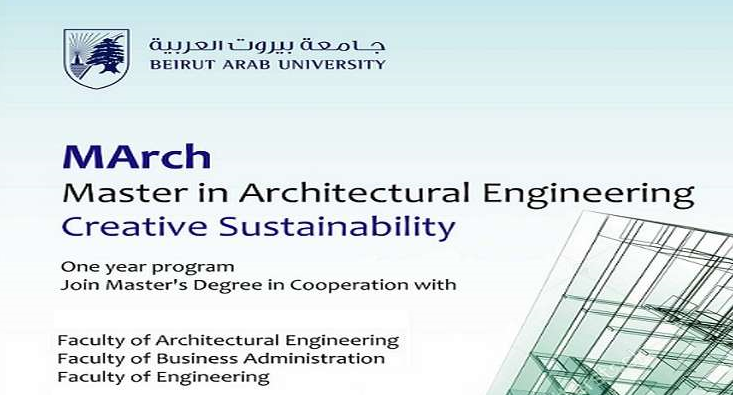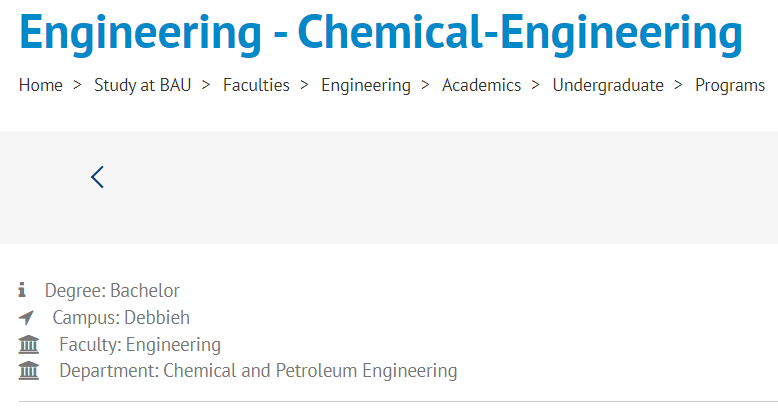Specific Courses on Sustainability
The Faculty of Health Sciences at Beirut Arab University presented by Dr. Leila Itani, Assistant Professor at the Nutrition & Dietetics Department delivered a lecture on the 8th of April 2022 entitled "Sustainable Healthy Dietary Patterns".
This participation was part of 8 modules offered through the educational activities of the series of SDGs Courses organized by the university of Pavia /Italy for Spring 2021-2022. The course aimed to provide knowledge on nutrition, lifestyle, and wellbeing, emphasizing a sustainable diet.
In this respect, Dr. Itani presented in her talk the role of the food system and unhealthy dietary patterns in disrupting the resilience of the earth’s biophysical limits and transgressing their safe operating space contributing to climate change and loss of ecological resources.
Through the lecture, the definition and composition of the recently proposed healthy sustainable diet and evidence on its role in maintaining food system activities within the safe operating space of biophysical planetary boundaries was presented.
This diet is said to contribute to two global agendas for the food system namely the twelfth SDG by ensuring “responsible consumption” and “Paris agreement” to reduce climate change while ensuring a lower diet cost.
Ultimately projection on the planetary healthy diet is shown to conserve people’s health and averting death and sustaining ecological resources, eventually ensuring achievement of the three dimensions of sustainable development: social, economic and environmental dimensions.
The Faculty of Science has received, on October 24th, 2019 the approval of the “Base-building projects for training in the South” of the Institute of Research for Development (IRD), France to co-fund the project “International Post Graduate Studies in Environmental Management and Sustainability for Mediterranean Countries)” (ENVIPRO-Med).
This project is designed to develop a Joint Postgraduate Master’s program between the Faculty of Science, Department of Biological Sciences at BAU and the Master “Ingénierie en Écologie et Gestion de la Biodiversité” (IEGB) of Montpellier University, France with partnership of the Environmental Observatory O-Life, Ministry of Environment of Lebanon, the Research Center for Environment and Development at BAU and ECO-MED, France.
It aims at improving environmental education and capacities of Lebanon and the region to address the severity and complexity of current environmental challenges. It focuses on overarching issues such as environmental sustainability, interdisciplinary aspects of ecosystem services and risk/benefit assessment with the integration of experiential learning opportunities.
The project highly emphasizes cooperation with industry and employers, local authorities and both governmental and non-governmental institutions and organizations to enhance innovation potential and employability of graduates.
It also addresses issues of transboundary concern in the Mediterranean Basin and build regional cooperation between Lebanon and France. The intended postgraduate program will be majorly new while benefiting of some existing graduate courses offered by MSc program in Environmental Science of the Faculty of Science and other courses of different departments at BAU.
It will be composed of 3 phases:
Knowledge sharing between partners and exchange of teaching and research ractices and institutionalization strategies at the IEGB of Montpellier University and Faculty of Science of BAU
Curriculum development and capacity building of Lebanese team involved delivering the intended program through a systematic multi-disciplinary approach
Launching of the program at BAU after finalizing all needed administrative and institutional approvals.
Master in Architectural Engineering – Creative Sustainability, (M.Arch.)
Master in Architectural Engineering – Creative Sustainability, (M.Arch.).
One-Year Program (28 Credit hours).
Joint master’s degree program at the Faculty of Architectural Engineering in cooperation of Faculty of Business Administration and Faculty of Engineering.
Admission Requirements
Applicants for the Master Degrees (M.Arch) must hold a Bachelor of Architectural Engineering Degree obtained from the Faculty of Architecture at Beirut Arab University or any recognized university, with a minimum CGPA of 2.33 for credit hour system students, or ‘’Good’’ for the academic year system students; or a Specialized Graduate Diploma with a minimum CGPA of 2.33 or its equivalent.
The Computer Engineering career encompasses opportunities in a wide range of areas such as industry, military, communications, aerospace, business, government, medicine, to name but a few.
Computer engineering is in steady progress with an ever-expanding job market. Specific jobs include the functions of designing, analyzing, and maintaining computer systems.
Furthermore, graduates can analyze, design, test, and evaluate network systems. In addition, they can develop, create, and modify general information security schemes.
In addition, they can develop, and test systems and application software programs. Trending areas in computer engineering comprise artificial intelligence and machine learning, cybersecurity, smart cities, autonomous driving, vehicular networks, and more.
Indeed, computer engineers enjoy high job satisfaction as reflected in market studies. In modern terms, computer engineers are digital transformation and world smartification leaders, believers in sustainable development, technology entrepreneurs and professionals with an engineering mindset.
The mission of the Computer Engineering (CE) Program is to prepare students for rewarding careers and higher education, engage in scientific research pushing the frontiers of the field even further, and get involved in local community issues requiring specialist participation.
The Computer Engineering Program is designed such that its students upon graduation will:
Possess the highest level of technical robustness in the field of computer engineering that will earn them recognition and esteem among their colleagues.
Have the knowledge and skills to invent novel technology, provide creative designs, and suggest innovative solutions to challenging problems.
Stay abreast of emerging technologies, continually learning new theory and skills to nourish ever-developing careers.
Demonstrate good citizenship, fulfilling their professional responsibilities towards their communities, Lebanon, and the World at large.
Excel on multi-disciplinary and multi-cultural teams, and effectively employ their oral and written communication skills to resolve problems.
The Electrical Power and Machines Engineering undergraduate program is accredited by the Engineering Accreditation Commission of ABET
Mission
The Department of Electrical and Computer Engineering offers a Bachelor of Engineering in Electrical Power and Machines (EPM).
The EPM program focuses on both the theoretical and practical aspects of power engineering by addressing the fundamental concepts of engineering mathematics, physical sciences, electrical machines, Power Electronic Circuits, Electrical Power System Analysis, and high voltage engineering.
The department plays a vital role in providing Lebanon and the region with qualified electrical power engineers.
The department also offers Master and Ph.D. degrees in electrical power engineering to cater for working professionals in electrical power companies, utilities, manufacturing establishments and the energy sector in Lebanon.
Objectives
The educational objectives of the program are determined to support career advancement of the graduates and as they pursue their career goals, the graduates will:
Advance in engineering careers involving the design, optimization, and implementation of electrical systems, take innovative entrepreneurial ventures, and /or successfully pursue an advanced degree.
Acquire new knowledge and adapt to emerging technologies.
Assume leadership roles in multidisciplinary teams and promote sustainable eco-solutions in contemporary issues.
Communicate effectively and demonstrate ethical and professional behavior in a multicultural work environment.
Student Outcomes
An ability to apply knowledge of mathematics, science, and engineering.
An ability to design and conduct experiments, as well as to analyze and interpret data .
An ability to design a system, component, or process to meet desired needs within realistic constraints such as economic, environmental, social, political, ethical, health and safety, manufacturability, and sustainability.
The Chemical and Petroleum Engineering Department is devoted to educating exemplary chemical engineers by instituting best learning practices that drive knowledge, build skills and competencies, and inspire the learner to define a purpose, develop a passion to forever learn, cultivate a sense of responsibility toward the profession, society, and the environment, and attain the ability to confront challenges, and in so doing contribute to the advancement of the community, immediate and beyond.
Objectives
The educational objectives of the Chemical Engineering (ChE) program are determined to support career advancement of the graduates and as they pursue their career goals. Chemical Engineering program objectives are:
Provide Students with the education and training in the field of chemical engineering through the study of chemical manufacturing or industrial processes by transforming raw materials into consuming products through the design, construction and management of factories.
Supply the student with basic Chemical Engineering knowledge necessary for industrial practices.
Meet the growing needs to face future difficulties in the Lebanese and Middle East Chemical industries.
Learning Outcomes
an ability to apply knowledge of mathematics, science, and engineering.
an ability to design and conduct experiments, as well as to analyze and interpret data.
an ability to design a system, component, or process to meet desired needs within realistic constraints such as economic, environmental, social, political, ethical, health and safety, manufacturability, and sustainability.







